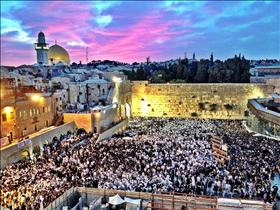Conflict of religion and state consumes media, political, and public discourse
Three battle fronts: The Kotel, Conversion, and Shabbat
Israel's religion and state conflict is viewed as a key component of shaping Israel's path. Recent days have provided us with a good cross section of the scope, depth, motivations, impact, and potential consequences of this ongoing saga.
Uri Regev 26/06/2017 19:47
Tags: Western Wall · conversion · Shabbat

The Western Wall during Shavuot, source: Wikipedia
Anyone who is in Israel cannot escape the realization that the ongoing conflict of religion & state is front and center, consuming tremendous media, political, and public discourse.
The Jewish Agency for Israel Board of Governors convening in Jerusalem, Israel this week decided to cancel a festive dinner gathering with PM Benjamin Netanyahu at The Knesset and to cancel its normal schedule, replacing it with deliberations regarding the recent government decisions. This shows that this is not just one additional, minor friction in a long list of disagreements.
What transpired this week is:
- A permanent suspension of the Israeli government's historic Western Wall Agreement with the Reform & Conservative movements and the Women of the Wall, which took more than three years to hammer out. It has now been thrown out, per the demand of the Chief Rabbinate of Israel and the ultra-Orthodox political parties (Shas Party and United Torah Judaism) who are on a war path with Reform Judaism and Conservative Judaism.
- The Ministerial Legislative Committee approved a legislative initiative, submitted by Rabbi Aryeh Deri's Ministry of Interior intended to kill two birds with one stone. By granting, FOR THE FIRST TIME IN ISRAELI HISTORY, the sole control over conversions performed in Israel to the Chief Rabbinate (even with regard to non-religious, civil matters), they aim to undo consistent Supreme Court rulings to the contrary, preempting anticipated future rulings in pending cases involving Reform and Conservative converts, and undercutting recent Modern Orthodox initiatives that offer a more lenient avenue for conversion.
- Feeling that they are on a roll, the leaders of the ultra-Orthodox political parties are now demanding legislation, which would undo both Supreme Court ruling and Municipal Ordinances that allow for limited opening of convenience stores in Tel Aviv on Shabbat.
The first of these targets non-Orthodox Jews, the second widens its scope to include Modern Orthodox Judaism, and the third hits the broadest swath of Israeli society - the general public of Tel Aviv and those who visit it on Shabbat.
The first of these targets non-Orthodox Jews, the second widens its scope to include Modern Orthodox Judaism, and the third hits the broadest swath of Israeli society - the general public of Tel Aviv and those who visit it on Shabbat.
Needless to say, all three initiatives are in directly opposite the will of the overwhelming majority of Israelis, as repeatedly demonstrated in public opinion polls, such as Hiddush's own systematic polling.
A minor consolation can be found in the fact that this not all the tides are shifting in one direction - we at Hiddush - for Religious Freedom & Equality are glad to provide a ray of light and progress in that the Israel Defense Forces and the Israel Ministry of Defense have just informed us, in anticipation of our pending petition regarding religious freedom and military burials, that they have changed the military regulations. Now, FOR THE FIRST TIME, the families of fallen soldiers have the option to opt out of Orthodox, military Rabbinate-dictated funeral ceremonies, AND military funerals are now available for families who chose to bury their fallen soldiers in civil cemeteries.
A no less important ray of hope can be found in the strong position expressed today by Jewish Agency Head Natan Sharansky who said:
"After four years of intensive negotiations, we reached a solution agreed upon by all the major religious streams, which was adopted by the government and welcomed by the Jewish communities around the world. Today's decision reneged on that agreement and makes it exceedingly difficult to us to bring Israel and the Diaspora closer."
And MK Yair Lapid, head of Yesh Atid, who in recent months has been wavering on matters of religion and state, has today announced an unequivocal, strong position, which may provide an indication, as to his reconfigured direction for the future:
"Millions of Jews got the message yesterday that they are not wanted at the Western Wall. They were forbidden entry to the holiest Jewish site. [These people] don't understand whom they've expelled; Senators, Members of Congress, an overwhelming majority of the pro-Israel lobby, the big donors, the people we always ask to work for us in Washington, District of Columbia so that Israel receives advanced weapons and increased aid."